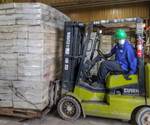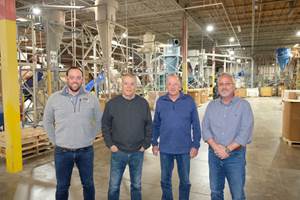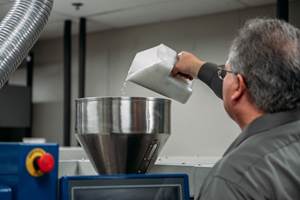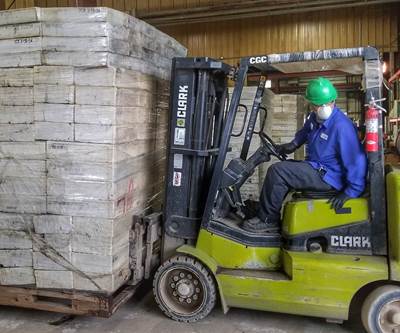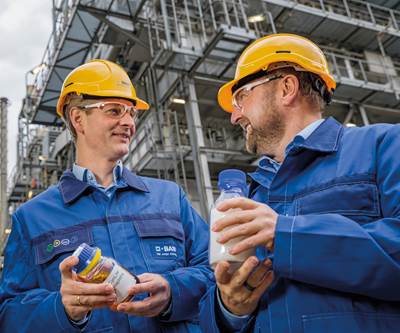Encina Turning Plastic Waste Into Renewable Base Chemicals and Fuels
Encina’s initial U.S. facility will implement the proprietary technology to produce the valuable renewable chemicals and can take plastic in varying conditions – from post-consumer, mixed plastics to ocean plastics.
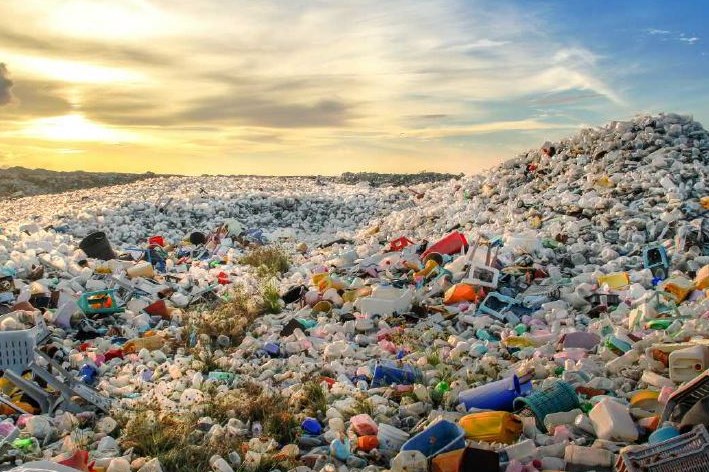
Encina can take in a wide variety of waste plastics without excessive handling, sorting and cleaning.
In recent years, the recycling industry is seeing all kinds of innovation and advancements in technology. A key area of this is through advanced recycling technologies.
Encina is a company emerging in this area as it is focused on transforming plastic waste into renewable chemicals and renewable fuels for the circular economy.
Benzene, toluene, and xylene (BTX) are important building blocks for a variety of widely-used products including pharmaceuticals, clothing and glues. Regular BTX is typically derived from the catalytic reforming of naphtha in a petroleum refinery. Striving towards a waste-free future, some technology companies have been looking at sustainable ways to create BTX.
Encina has developed a process that economically extracts BTX from plastic waste through catalytic pyrolysis. It enables the “cracking” of hydrocarbons to create pygas which contains the aromatics. These are then extracted, captured and delivered to Encina’s end customers.
David Schwedel, executive director of Encina Development Group, said that Encina is focused on addressing the waste issue of of plastics (#1 PET; #2 HDPE; #3 PVC; #4 LDPE; #5 PP; #6 PS; #7 other), with a focus on the hard-to-handle plastics of #3-7.
“That seems to be where a majority of the problem is,” he said. “In talking with large waste recyclers and municipalities that operate MRFs to solid waste management folks, there isn’t a program that deals with 3-7.”
Encina seeks to capture the material before it goes straight to the landfill.
“If we can capture that, it will give us the renewable fuel stream and help to resolve the issue and help create a closed-loop economy,” he said. “If you have large quantity of 3-7, give us a call and we’ll take it. We’re a solution-driven company and want to team up with folks directly in the industry.”
New Partnership
Worley, a provider of professional project and asset services in the energy, chemicals, and resources sectors, will work with Encina on engineering, procurement, and construction (EPC) services for the company’s consumer plastics to benzene-toluene-xylenes (BTX) processing plant in the U.S.
Encina’s initial U.S. facility will implement this proprietary technology to produce the renewable chemicals and can take plastic in varying conditions. Worley is currently working on the engineering package for the U.S. plant that is modularly scalable to take on more capacity. This allows Encina to increase throughput as more feedstock becomes available.
The plant is the first of many planned facilities across the world – with future sites in Europe, Asia, Latin America, and Africa.
“Encina is excited to work with Worley through the entire EPC process, and to have them manage the operations and maintenance for each Encina facility around the world. We have come to entrust Worley as a key partner in our design and implementation to help resolve the global issue surrounding plastic waste,” Schwedel said.
Encina also recently announced that it has appointed Carlo Badiola to senior vice president of engineering and technology. In his expanded role, Badiola will lead Encina’s team in engineering design, technology development and implementation, operations and maintenance, and continuous asset value improvement.
“Over the past few years, I have become more and more excited about the global opportunity that Encina has in front of us. We have an industry-changing technology, which has evolved to become a defining moment for managing the plastics waste problem around the world,” Badiola said. “Being a part of the solution to increase efficiency and capacity for plastics recycling, and working with our Encina team to make recycling happen is what motivates each of us in the Encina team.”
Related Content
Evolving Opportunities for Ambitious Plastics Recycler
St. Joseph Plastics grew from a simple grinding operation and now pursues growing markets in recycled PP, food-grade recycled materials, and customized post-industrial and post-consumer compounds.
Read MoreCoinjection Technology Showcases Recycled Material Containment
At Fakuma, an all-electric PXZ Multinject machine sandwiches a black core made of mechanically recycled PC/ABS within an outer layer made of chemically recycled ABS.
Read MoreMarket Changes Spur Industrial Recycler to Enhance Capabilities in Clear Plastic Reprocessing
Butler MacDonald found new ´óĎó´«Ă˝ and flexibility thanks to a big step-up in purging efficiency.
Read MoreNovel Line Turns Fluff to Blown Film
Processor Bioflex of Mexico is utilizing Reifenhäuser Blown Film’s EVO Fusion technology to integrate postindustrial and postconsumer recycled materials into products.
Read MoreRead Next
Agilyx: Recycling Must Continue Operating During the Coronavirus Pandemic
Agilyx CEO Joe Vaillancourt discusses the status of the company's operations and the importance of recycling during the COVID-19 pandemic.
Read MoreRecycling: Expanding 'Circularity' through Advanced Recycling Technologies
Recycling and achieving circularity for materials is at the core of the plastics industry’s evolving sustainable ´óĎó´«Ă˝ model. Advanced technologies will play a big role.
Read MorePlastics-to-Oil Recycler Finds New Niche in Polystyrene
Agilyx is in an innovative area of recycling: extracting value from waste plastic streams. The company has expanded to develop the first full-circle chemical recycling of PS.
Read More
